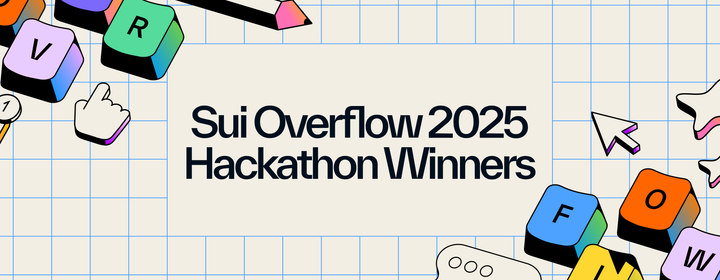Recap 7/7 Sui AMA: Gaming with Koh Kim
This recap covers an AMA about building games on Sui with Koh Kim.

Jen:
Welcome to the next rendition of our AMAs. This time we're featuring our lovely head of ecosystem over at Mysten Labs.
Koh:
My name is Koh Kim and I handle everything external facing at Mysten. So I think a lot about:
- How do we grow communities?
- How do we inspire builders to bring cool experiences to our platform?
- How do we enable the broader community to learn and become great developers?
I studied applied game theory and statistics during university, and I thought I wanted to be an academic. However, my university mentor advised otherwise, so I decided to try the real world as a summer intern at Motorola doing research on future hardware and software trends. After university, I spent a few years at a consulting firm before joining Google as a product marketer.. a quantitative marketing consulting firm focused on.
From product marketing, I moved into partnerships working with Google’s new and emerging products. My most notable achievement was scaling the Google Play games teams and businesses globally. I am also an angel investor and advisor for many consumer tech companies, especially in the gaming space. I’ve helped web3 projects such as SkateX and Panzerdogs.
Now, here I am at Mysten Labs. All signs are pointing towards my jump into web3 and what better place than here at this company and for Sui.
. . .
Question #1: Why should games build on Sui?
Koh:
Sui assets are now modeled as objects where attributes can be defined, or the objects can be combined into new objects. In a game, you can have a sword that gathers experience points to increase levels where the points and levels are defined as attributes. You can also combine different items like a sword and jewel to make a new sword. All of this can be recorded on-chain.Outside the game, it has implications for the distribution, payments and marketing as these activities always have intermediary platforms taking a cut of the revenue.
. . .
Question #2: Why should games build on Sui?
Koh:
Our technology is so different from other chains that “competitors” that it reminds me of the time of transition from dial-up to broadband Internet. Even though the dial-up was very slow and janky, it was so magical that you can talk to someone from Sweden with a keyboard and mouse. Now that we have broadband, the Internet is very different.
The question we get asked a lot is “Why another Layer 1?” There are a ton of Layer 1 chains out there. For a developer, it's very confusing. Right now, most developers view each Layer 1 as an audience where they can acquire users instead of utility. That's why it's really important to focus on what are the use cases that will bring value to the end-user, and I feel that Sui is the only Layer 1 that will enable those experiences.
We often get a lot of comparison with Aptos as both founding teams have origins from Facebook’s Diem. At the surface level, it does look similar, but I always suggest digging deeper into teams’ backgrounds and their actual contributions, especially when it comes to deep tech plays like infrastructure. Unfortunately, a lot of people don’t really do enough due diligence, and it’s hard to evaluate early-stage companies with very little public info like us.
When I think about competition, there is a difference between perspectives and perception, but then there's also reality. For me, I will let the product speak for itself and focus on builders. One year from now, it's going to be very different. Taking things into perspective, there are a lot more engineers at Meta than Solidity engineers in the entire world. If you look at the adoption of a programming language like JavaScript, I wouldn't necessarily say Ethereum (Solidity) has won or anyone has won. It’s because blockchain is in its dial-up era. As soon as we hit the broadband era, it'll be very different.
Jen:
It lures you in without you suspecting it, you’re enjoying the experience of the game as opposed to thinking mechanics.
Koh:
If you think about it, everyone has a mobile phone. There's no way you can beat that distribution and it hurts to say, you still have to play by Apple and Google's rules.
Players are going to feel valued if they feel like they're investing their time, not necessarily spending; so you have to convince them that the experience is worth their time, to begin with.
Why put all of these unnecessary barriers like having a wallet, acquiring an NFT, and getting tokens? You're dead on arrival. You're gonna just have a forever smaller addressable market. That being said, I do think there are going to be games that are going to be perfectly fine and sustainable. With all of that, I don't think you have to reinvent the wheel for onboarding.
. . .
Question #4: What will game development look like on Sui? Do we have plans for a Game Engine SDK to release in the future like Unity and Unreal? And what would the gaming roadmap look like?
Koh:
Unity, in particular, is probably more of an interesting target to me versus Unreal, but I think they're both important in different ways.
- Unity has a much more diverse community. It's definitely a little bit more usable, and more indie.
- Game studios that are looking to pivot to web3 use Unity as the engine, especially for mobile.
- There's another marketplace-like ecosystem of developer tools and applications that are built on top of either Unity or Unreal that allow game developers to build.
The Unity plugin is going to be fairly straightforward, especially for adding that to our SDK. It’s going to give us the biggest breadth of the game types and genres that we'll be looking for. There are really cool ways to support the broader community and bring them into the Sui ecosystem but I can't divulge in that just yet.
On the other hand, Unreal is a little bit interesting because it's really focused on the triple-A game. For me, that's definitely more of a long-term view as those games tend to have at least a minimum of five to seven years of development times, often your 10-years development times to get to the quality one wants, and it's definitely a bigger risk. With that being said, there are a few game products we're looking at on Unreal, and also building tool sets and evaluating how Web3 would work inside their game, especially in the MMO RPG genre.
Jen:
I'm aware, that for a triple-A title, the roadmap is much longer because there will be a lot of hiccups in beta testing that developer's studios endure, particularly in Blockchain Web3 gaming.
Koh:
We're very well aware that it takes time to build a game, and also may take multiple tries, and then on top of that, you're at the mercy of how good your user acquisition and community-building strategy is. In the end, it depends on if you can get the distribution. If no one knows about it, it’s probably never gonna be successful. That's why the community side is important, especially with what we see in blockchain technology: how it's going to empower and enable the fanbase of these games. On top of that, they are telling their friends about the game and now you have a blockchain with transparency.
It’s gonna be really interesting that game developers and companies are going to have more transparency with the players themselves, thus being able to build more direct relationships.
. . .
Question #5: Are there plans to create a store or a marketplace where people can discover Sui games?
Koh:
Yeah, there are a couple of marketplaces we’re working with. The way that we see our store strategy is:
- We are working with more third-party projects and definitely talking to a lot of, I would say, non-Mysten/Sui companies that are looking to build marketplaces or whether there are either wanted to support the chain as another chain or maybe make an exclusive destination similar to what Magic Eden did for the destination on Solana NFTs.
- We also have a few markets and projects that are looking to be multi-chain but I'm of the opinion that we should be a platform rather than an app developer because building a marketplace is one thing, and managing and growing as a business is another and that's where we would like to collaborate with a third-party, new developers.
. . .
Question #6: Have you found that developers are concerned about building on Sui because they are not familiar with the Move programming language?
Koh:
Move was originally designed to be an object-oriented programming smart contract language and the reason why it was designed to be like that is because that's what most web2 object-oriented programming languages are. This really is a pretty hard language to learn if you're coming from scratch. I always say, and I don't blame the developers, lazy code already exists, why reinvent the wheel? I think a lot of that is if the code is vetted for minting an NFT, after a while, it's gonna look pretty similar.
We also had feedback from experienced solidity developers evaluating Move versus Rust.
For experienced solidity developers going to Move, we've heard it only took them five to six days. Also, Move is designed to be a cross-platform language, some of these chains' EDM included Cielo rhyme low-level virgins so a lot of the basic functionality should still apply even for those chains, and the flexibility also the ISA learning from an experience, smart contract developer all the way to a newbie just starting out that they came from the web2 world. It's gonna be really exciting to see how many people become Move developers just because it's a lot more accessible and more straightforward.
. . .
Question #7: Can you share information on the possibility of creating mobile Android games as an app and not as a web browser?
Koh:
For games, in particular, you probably have to create a mobile game version. With the understanding of acquisition and attribution, a mobile version would be more effective. If you think about it, people are living in an app world, they're not living in a website world to some extent. I think It's hard for people to learn new behaviors. You need to figure out things that they do, how do you make behavior that's tricky, but not a huge hurdle for that level? And in most cases, it's probably just integrated and things they already do, to begin with.
Jen:
Correct, I want to give you some time to close it with your thoughts, and takeaways before we close out the AMA.
Koh:
Final takeaways, Sui’s process is coming along but it's not ready- we're not ready yet, but there are a lot of cool things we're looking at. I would say the biggest thing is that I do want to thank everyone that's here in the community for getting excited about Move the programming language and also Sui as a layer one. We're really excited to be here and to be building this all together as well as also helping developers succeed because, in the end, we're building platforms to see our builders succeed.
It's not really about us, it's about builders like yourselves that are out there because we have a belief in the decentralized future. For those that are very interested in the gaming world, I think gaming is a pretty good Trojan horse for me to get more people to understand and get excited about Web3 technology. So I'm really looking forward to seeing how our ecosystem develops.



